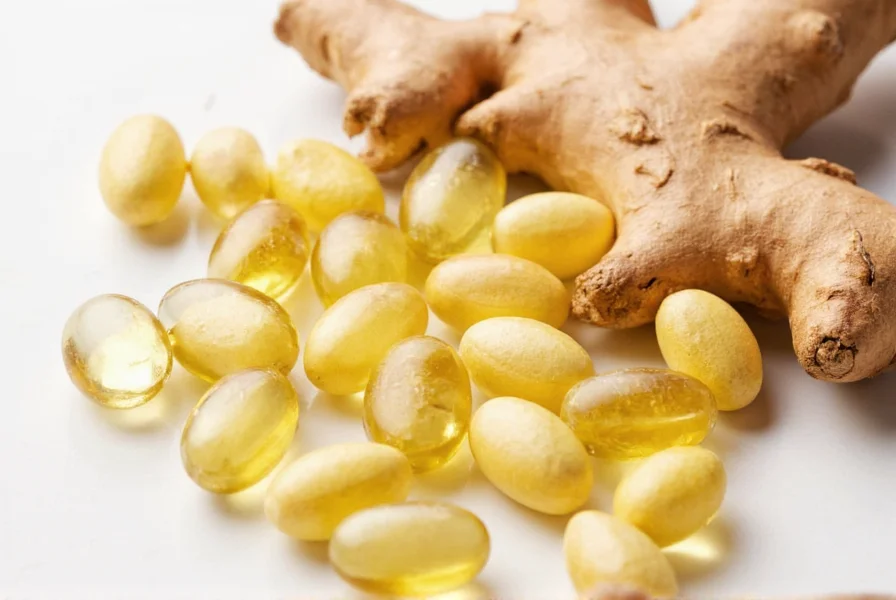For centuries, ginger has been valued in traditional medicine systems worldwide. Today, modern science is validating many of these traditional uses, particularly regarding ginger supplements. Unlike culinary ginger, standardized supplements provide consistent concentrations of active compounds like gingerols and shogaols, making them valuable for targeted health support. This article examines the evidence-based benefits of ginger supplements, proper usage guidelines, and important safety considerations.
Science-Backed Health Benefits of Ginger Supplements
Nausea and Digestive Support
Ginger supplements demonstrate remarkable effectiveness against various forms of nausea. A comprehensive review of 12 studies found ginger significantly reduces pregnancy-related nausea without adverse effects on母婴 health. Clinical trials show ginger outperforms placebos for motion sickness and post-operative nausea, with participants reporting up to 38% greater symptom relief. The mechanism appears related to ginger's ability to accelerate gastric emptying and modulate serotonin receptors in the digestive tract.

Anti-Inflammatory and Pain Relief Properties
Research published in Arthritis demonstrates ginger supplements' effectiveness for osteoarthritis management. Participants taking 500mg ginger extract daily for 12 weeks reported 30% greater pain reduction compared to placebo. Another study in the Journal of Pain found daily ginger supplementation reduced exercise-induced muscle pain by 25%. These effects stem from gingerols' ability to inhibit inflammatory pathways similar to NSAIDs, but without the gastrointestinal side effects.
Blood Sugar Regulation
Emerging research suggests ginger supplements may benefit metabolic health. A 2015 clinical trial with 41 diabetic patients showed 2 grams of ginger daily significantly lowered fasting blood sugar (10.5%) and HbA1c levels (10.2%) compared to placebo. The active compounds appear to enhance insulin sensitivity and reduce oxidative stress. While promising, researchers emphasize ginger should complement—not replace—standard diabetes management.
Cardiovascular Health Support
Multiple studies indicate ginger supplements may improve heart health markers. Research in the Journal of Cardiovascular Pharmacology found ginger supplementation reduced LDL cholesterol by 17% and triglycerides by 25% in participants with hyperlipidemia. Additional evidence suggests ginger may help regulate blood pressure through its vasodilatory effects. These cardiovascular benefits appear connected to ginger's antioxidant and anti-inflammatory properties.
Ginger Supplements vs. Fresh Ginger: Understanding the Differences
While fresh ginger contains beneficial compounds, supplements offer standardized concentrations that provide consistent therapeutic effects. The table below compares key differences:
| Characteristic | Ginger Supplements | Fresh Ginger |
|---|---|---|
| Active Compound Concentration | Standardized (typically 5% gingerols) | Variable (0.5-3.5% gingerols) |
| Daily Therapeutic Dose | 1-2 grams (standardized) | Requires 10-20 grams (variable potency) |
| Convenience | Easy daily dosing | Preparation required |
| Research Support | Consistent clinical evidence | Limited clinical studies |
Proper Usage Guidelines for Maximum Benefit
For nausea relief, clinical studies typically use 250-500mg capsules taken 4 times daily. Osteoarthritis research shows benefits with 500mg twice daily. Blood sugar studies used 2 grams daily divided into multiple doses. Taking ginger supplements with food enhances absorption and reduces potential stomach irritation. Effects typically become noticeable within 1-2 weeks of consistent use.
Safety Considerations and Potential Interactions
Ginger supplements are generally safe at recommended doses, but may cause mild heartburn or mouth irritation in some users. Crucially, ginger has blood-thinning properties, so those taking anticoagulants like warfarin should consult their physician before use. Diabetics should monitor blood sugar closely as ginger may enhance medication effects. Pregnant women should limit intake to 1 gram daily and avoid ginger supplements during the first trimester without medical approval.
Choosing Quality Ginger Supplements
Not all ginger supplements deliver equal benefits. Look for products standardized to contain 5% gingerols, the primary active compounds. Third-party testing seals from NSF, USP, or ConsumerLab indicate quality verification. Enteric-coated capsules prevent stomach irritation and improve absorption. Avoid products with unnecessary fillers or artificial additives. Reputable brands typically provide transparency about sourcing and manufacturing processes.
Evidence-Based Perspective on Ginger Supplement Benefits
Ginger supplements offer several scientifically supported health benefits, particularly for digestive issues, inflammation, and metabolic health. While not a miracle cure, they represent a valuable complementary approach when used appropriately. The strongest evidence supports ginger for nausea management and osteoarthritis symptom relief. Emerging research shows promise for blood sugar and cardiovascular health, though more studies are needed. As with any supplement, realistic expectations and medical guidance are essential for safe, effective use.
Frequently Asked Questions
How long does it take for ginger supplements to work for nausea?
Most clinical studies show ginger supplements begin reducing nausea within 30-60 minutes of ingestion, with maximum effects occurring within 2-3 hours. For chronic conditions like morning sickness, consistent daily use for 3-5 days typically provides the most significant relief.
Can ginger supplements lower blood pressure effectively?
Research indicates ginger supplements may modestly reduce blood pressure, particularly in individuals with hypertension. A 2019 meta-analysis found an average reduction of 8 mmHg systolic and 6 mmHg diastolic after 12 weeks of daily supplementation. However, ginger should not replace prescribed blood pressure medications without medical supervision.
What's the difference between ginger extract and powdered ginger supplements?
Ginger extract supplements typically contain concentrated gingerols (usually standardized to 5%), providing more potent effects in smaller doses. Powdered ginger supplements contain the whole root in dried form, requiring larger doses for similar benefits. Extracts generally show better absorption and more consistent results in clinical studies compared to powdered forms.
Are ginger supplements safe for long-term daily use?
Studies monitoring ginger supplement use for up to 2 years show good safety profiles at recommended doses (up to 2 grams daily). However, long-term use above 4 grams daily may increase bleeding risk and cause gastrointestinal issues. Most healthcare providers recommend cycling supplements—using them for 8-12 weeks followed by a 2-4 week break—for optimal safety.











 浙公网安备
33010002000092号
浙公网安备
33010002000092号 浙B2-20120091-4
浙B2-20120091-4